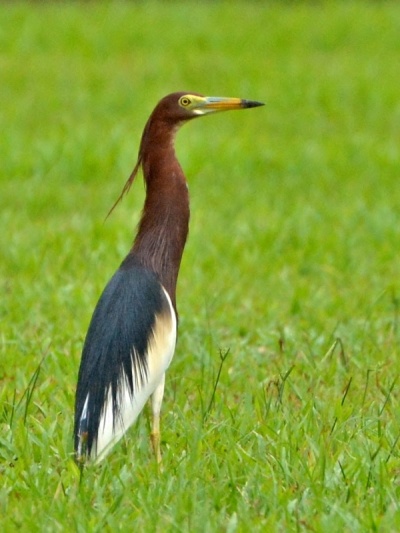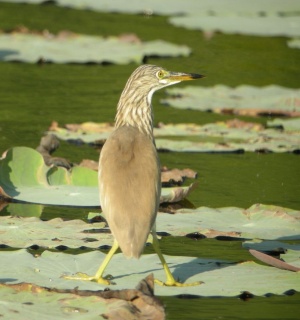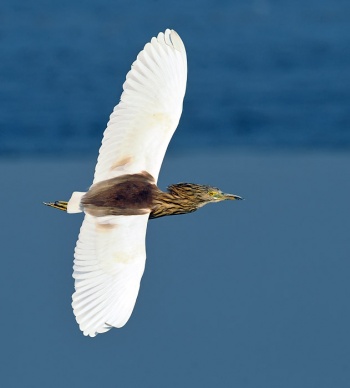- Ardeola bacchus
Identification
42 - 52 cm.
- Dark maroon head and upper breast
- Rufous crest plumes
- Longish black plumes on back, extending beyond tail
- White wings, throat, belly and rest of upperparts
- Longish dark grey plumes on pectoral Region
- Yellow legs, becoming pinkish red in breeding season
- Yellow bill with bluish base and black tip in breeding season
- Golden-yellow eye and greenish yellow facial skin
Sexes similar. Females have a paler foreneck, shorter plumes and browner scapulars and tertials.
Non-breeding adults are very similar to Indian Pond Heron and Javan Pond Heron, but they have darker backs and tips to primaries.
Juveniles are Brown, heavily streaked buff and dark brown and have whitish underparts with heavy brown streaking.
Similar species
In breeding plumage has darker head and upper breast than Javan Pond Heron and rufous crest plumes (not whitish buff). Javan Pond Heron is also shorter-winged, smaller-billed and smaller-bodied.
In non-breeding plumage has a darker back than Squacco Heron and lacks any black streaking on head and crest.
Distribution
An East Asian bird breeding from north-east India and Burma east to southern China and north to Beijing and Japan. Has bred in Manchuria. Northern birds are migratory, wintering south to Indochina, Malaysia and Indonesia as far as Borneo.
Recorded in the Western Palearctic only in Norway in autumn 1973 and an adult in summer plumage at Hortobagy in Hungary in August 2000. The origins of these birds are unknown but the Norwegian specimen has been accepted as a wild bird. The Hungarian bird will probably also be accepted as this species is not widely kept in captivity and it appeared after a spell of hot weather with strong easterly winds, ideal for Asian vagrants.
Also accidental vagrant to St. Paul Island, Alaska.
Taxonomy
This is a monotypic species[1].
Forms a superspecies with Javan Pond Heron, Indian Pond Heron and probably also Madagascar Pond Heron.
Habitat
Usually freshwater, especially paddyfields, also marshes, riverbanks and lakesides.
Behaviour
Breeding
The clutch consists of 3-6 bluish-green eggs.
Diet
The diet includes insects, crustaceans and fish.
References
- Clements, JF. 2009. The Clements Checklist of Birds of the World. 6th ed., with updates to December 2009. Ithaca: Cornell Univ. Press. ISBN 978-0801445019.
- Wikipedia
Recommended Citation
- BirdForum Opus contributors. (2024) Chinese Pond Heron. In: BirdForum, the forum for wild birds and birding. Retrieved 28 April 2024 from https://www.birdforum.net/opus/Chinese_Pond_Heron






